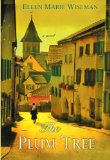Write your own review!
Amy
(01/18/13)
I couldn't put down The Plum Tree
The Plum Tree captured my heart and I carried it around until I was finished reading, stealing moments whenever I could just to get in another page or two or ten.
Not only was the WWII, the German landscape, the family characterizations, and the historical essence incredibly vivid -- but it was well-balanced. I didn't feel too overwhelmed by the sadness or by the love story. I thought Wiseman's writing was eloquent, literary and yet completely accessible to everyone.
I believe that The Plum Tree is going to become a modern classic love story.
Anne Barnhill
(01/18/13)
Loved This Book!
The Plum Tree, by Ellen Wiseman, brings the reader into Germany during WWII. At the heart of the book is Christine Bolz, a young woman who lives with her family in a small village. This book, hauntingly terrifying yet filled with great humanity, explores the ethical dilemma facing citizens when their government has gone wrong. I completely enjoyed this book!
Erika Robuck
(01/18/13)
Outstanding Historical Fiction
Set in Germany during the second world war, THE PLUM TREE, is the story of a young, poor, Christian woman who falls in love with her wealthy employer’s son, a young, Jewish man named Isaac. As their secret love blooms, Hitler’s dark shadow begins to spread over the land by way of anti-semitic posters, propaganda, and oppressive laws, including the Nazi proclamation that Christians could no longer work for Jews.
Torn apart as their love is just beginning to bloom, Christine and Isaac believe their bond cannot be broken by physical separation alone, and vow to find each other after the war. But as the increasing horrors of living in war-time Germany build, Christine and Isaac find themselves facing the unimaginable hell of the Nazi concentration camps, where every moment of every day means the difference between life and death, survival and destruction.
THE PLUM TREE is powerful and highly evocative. Memorable and honorable characters populate its pages, and Wiseman provides a window into the lives of ordinary German citizens as horror struck by the Nazis as the rest of the world. Her attention to research and historical detail is clear and fascinating, and I learned so much about the German people at that time that I’d never known. Christine and Isaac are worthy protagonists, facing hardship with humanity, determination, and vast but believable courage, and the portrayal of the bonds of family in THE PLUM TREE is particularly moving.
It’s no easy task to write a novel set during the second World War that explores new territory with characters of the greatest worth and hope, but Wiseman has done so to great effect. I was moved to tears many times during THE PLUM TREE, and its characters will stay with me long after I’ve finished reading the book. If you enjoyed Tatiana de Rosnay’s SARAH’S KEY or Jenna Blum’s THOSE WHO SAVE US, you will love THE PLUM TREE. I give it my highest recommendation.
Barbara Claypole White
(01/18/13)
A Thumping Good Read
I'll be honest, I had mixed feelings about reading The Plum Tree. As the wife of a Jew and the mother of a teenager who would have been considered impure by the Nazis, I struggle with anything that circles the Holocaust. However, as a Brit, I grew up on firsthand stories of hardship during the Second World War. It was always the stories of everyday actions--some heroic, some not--that resonated with me. And this is what I loved most about The Plum Tree--the level of detail that allows readers to experience the lives of ordinary Germans during a moment in history that was anything but ordinary.
And yet The Plum Tree is much more than just a glimpse into rural family life during the evils of the Nazi regime. It's also a thumping good read--a hopeful story of survival, courage, and resilience. Christine is a fabulous heroine, and once I hit the half-way mark, you could not have wrestled her from me with a crowbar.
I hate spoilers, so I'll only say this: The novel is not over once the Allies liberate Germany. The plot twists and the shades of grey layered into Christine's story kept me engrossed until the last page. As her father says, "War makes victims all."
I highly recommend this wonderful debut novel.
Susann
(01/11/13)
A Disappointment
The Plum Tree is a good effort on an important subject, but its defects cause it to fall short of its presumed goal, namely to depict life as an ordinary German during and after World War II. The circumstances were dramatic enough, and don’t require the additional melodrama provided by the author to tell the story (no examples given so as to avoid plot spoilers). The dialogue is stilted (a young man to his girlfriend: “When we’re together, we’ll only see each other, not the ugliness around us.” A concentration camp commander to an inmate: “There are men here who have been turned by the evil that surrounds them. Their hearts have been plowed open to reveal the rotten soil of their souls.”). There are annoying and distracting stylistic affectations, such as every “yes” and “no” in dialogue being written as “ja” or “nein” and italicized (to remind us that the characters are really speaking German, not English?). The characters are one-dimensional; the good ones are noble, the bad ones are evil, and there is no one in between. Historical facts are very significantly altered; Dachau was undoubtedly a horrible place, but it was NOT an extermination camp with gas chambers and ovens. A reader who wants to learn about the lives of German civilians during this time period would do much better to choose Ursula Hegi’s Stones from the River.




